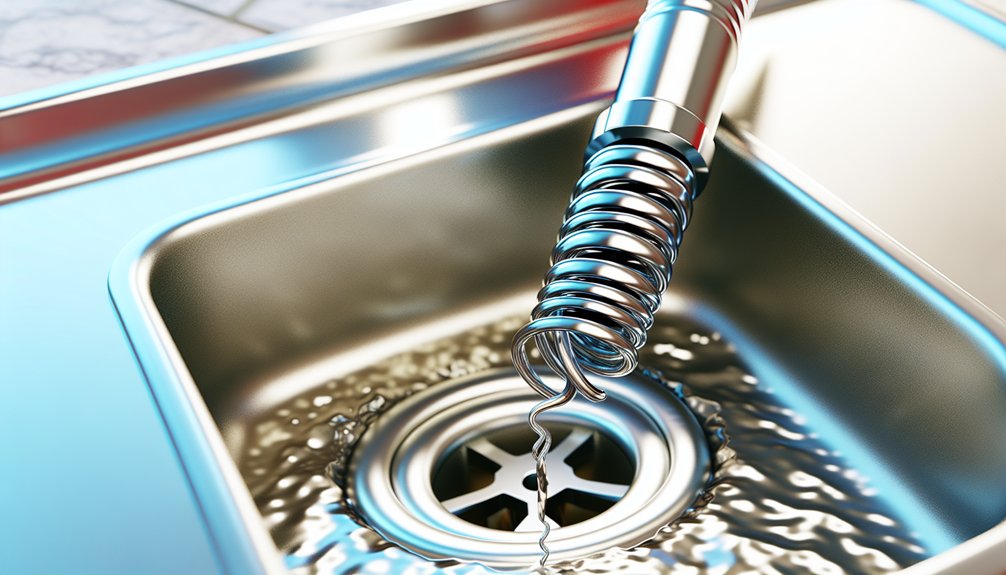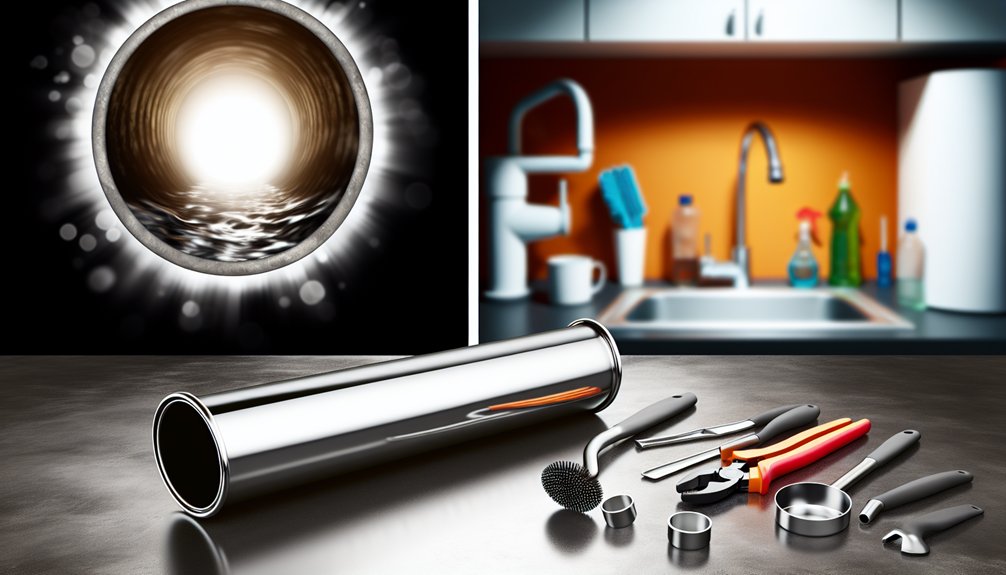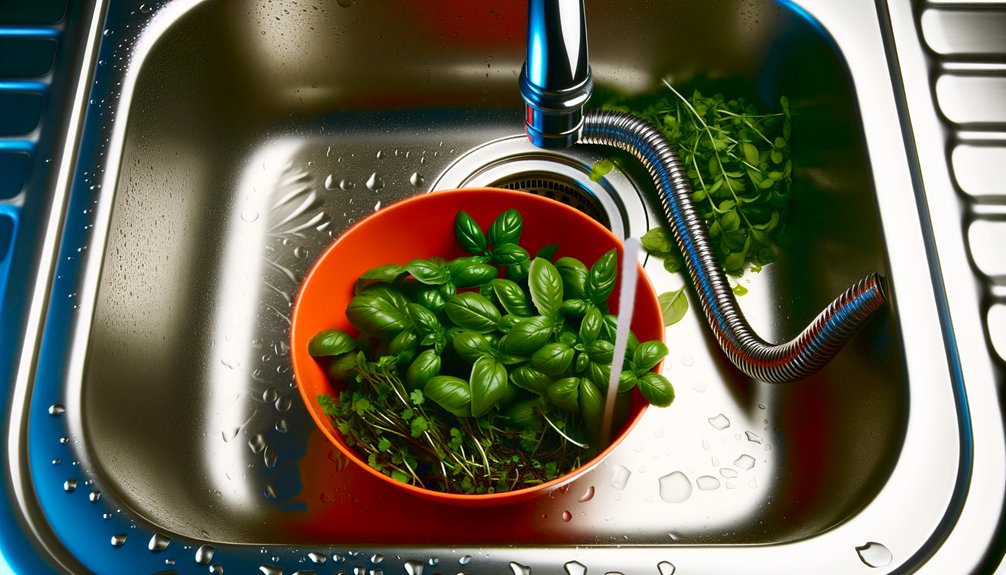Regular drain cleaning is essential for peak plumbing performance. It prevents clogs and slow drains by removing debris such as grease, hair, and food particles. This proactive maintenance reduces the risk of water damage by addressing potential leaks and preventing overflow. Additionally, routine cleaning extends the lifespan of plumbing systems by minimizing corrosion and strain from blockages. An investment in this maintenance guarantees efficiency and reliability while safeguarding property integrity. Understanding the broader benefits reveals even more advantages.
Prevents Clogs and Slow Drains

Regular drain cleaning serves as an essential preventive measure against clogs and slow drains. This routine maintenance effectively removes the buildup of common debris, including grease, soap scum, hair, and food particles, which are primary contributors to blockages. By addressing potential issues before they escalate, regular drain cleaning guarantees that the plumbing system operates smoothly, thereby preventing slow drainage problems. Neglected drains can lead to severe clogs requiring emergency plumbing services, underscoring the necessity of preventative maintenance.
Professional drain cleaning not only enhances the overall performance of plumbing systems but also promotes faster water flow, greatly reducing the risk of overflow incidents. Maintaining clean drains alleviates pressure on pipes, contributing to their longevity. As a result, regular drain cleaning is a prudent investment to prevent clogs and slow drains, guaranteeing the plumbing system remains efficient and reliable over time.
Reduces the Risk of Water Damage
Routine drain cleaning greatly reduces the risk of water damage in residential properties. By addressing drainage issues proactively, homeowners can avoid the costly repairs associated with water damage. Regular drain cleaning offers the following benefits:
Routine drain cleaning is key to preventing costly water damage and maintaining a healthy home.
- Prevents Clogs: Routine cleaning eliminates blockages that can lead to overflowing sinks and toilets.
- Identifies Weaknesses: Professional cleaning helps detect leaks or weak spots in the plumbing system before they escalate into severe problems.
- Reduces Pressure: By preventing clogs, routine maintenance minimizes the pressure within pipes, lowering the risk of catastrophic failures.
- Avoids Standing Water: Keeping drains clear prevents slow drainage, which can lead to mold growth and structural damage. Additionally, regular maintenance of sump pump systems can further protect against flooding and water damage.
Investing in regular drain cleaning is an essential aspect of home maintenance, safeguarding against water damage and preserving the integrity of the property.
Improves the Lifespan of Your Plumbing System

Maintaining clear drains not only mitigates the risk of water damage but also greatly enhances the lifespan of plumbing systems. Regular drain cleaning removes hard water deposits and mineral buildup that corrode pipes, thereby prolonging their durability. By preventing blockages caused by grease, hair, and food particles, routine maintenance reduces the strain on plumbing systems, allowing them to operate effectively.
| Benefit | Description |
|---|---|
| Enhanced Water Flow | Minimizes pressure buildup, reducing pipe wear. |
| Early Issue Detection | Prevents minor problems from escalating into costly repairs. |
| Professional Maintenance | Guarantees efficient functioning and longevity of the plumbing system. |
Investing in professional drain cleaning services is paramount for sustaining a robust plumbing system, ultimately leading to fewer repairs and a considerably extended lifespan. Regular maintenance is essential for ideal performance.
Frequently Asked Questions
Why Must Drains Be Cleaned Regularly?
What lies beneath the surface of a seemingly functional plumbing system? Regular drain cleaning is essential to prevent clogged drains, which can lead to significant plumbing issues. Routine maintenance guarantees peak water flow, eliminates unpleasant odors, and mitigates health risks associated with stagnant waste. While DIY cleaning may offer temporary relief, professional services guarantee thorough drain inspections, resulting in cost savings and enhanced system longevity. Prioritizing this task ultimately safeguards both home integrity and well-being.
What Happens if You Don't Clean Your Drains?
Neglecting drain cleaning can lead to clogged pipes, resulting in slow drainage and water backup. Over time, foul odors may emanate from decomposing debris, creating health hazards and attracting pests. Additionally, accumulated waste can cause plumbing issues, leading to costly repairs and potential property damage. The decreased efficiency of the plumbing system further exacerbates these problems, making regular maintenance essential to avoid extensive financial burdens and guarantee a healthy living environment.
Why Is Drainage Maintenance Important?
Drainage maintenance is essential for ensuring the efficiency of drainage systems and minimizing plumbing issues. By prioritizing clogs prevention, homeowners can enhance water flow and uphold hygiene standards. Regular maintenance not only protects property value but also mitigates the environmental impact of waste buildup. In addition, addressing potential problems reduces the likelihood of emergency repairs, leading to significant cost savings. Ultimately, effective drainage management is a key homeowner responsibility that promotes long-term sustainability.
Do Plumbers Recommend Drain Cleaner?
Plumbers generally do not recommend drain cleaner types, particularly those that contain harsh chemicals due to potential chemical risks. Plumbing myths often promote DIY methods for clearing common clogs, yet these can lead to long-term damage. Instead, professionals advise eco-friendly solutions and regular maintenance tips that prioritize system integrity. Frequency recommendations suggest routine check-ups, while a cost comparison illustrates that professional services can be more economical and effective than relying on chemical cleaners.


